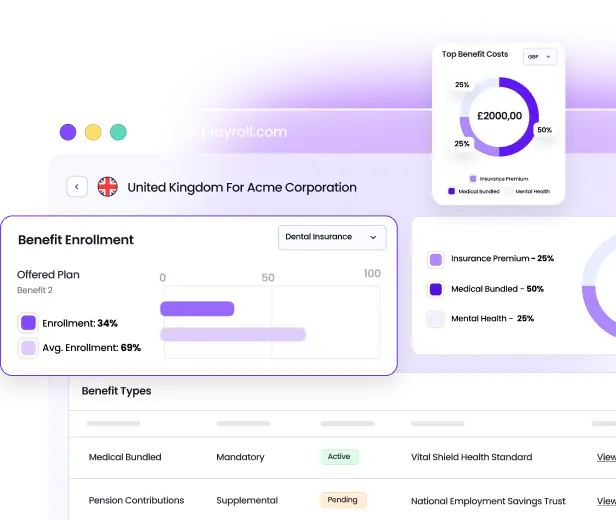Who Is Entitled to Employee Benefits In Mauritius?
In Mauritius, nearly all employees are entitled to a core set of benefits defined by national labor laws. Entitlements apply regardless of nationality and are primarily shaped by employment status, working hours, sector, and whether the employee is covered by a specific Remuneration Order. Full-time employees typically enjoy the widest protection, but part-time and fixed-term employees are still entitled to many statutory benefits on a proportional basis.
Legal requirements surrounding employee benefits in Mauritius are grounded in the Workers’ Rights Act, which mandates benefits such as paid leave, social security contributions, and health and safety protections. Employers should understand that compliance applies from day one of employment and that benefit entitlements may scale with length of service, job category, or earnings level.
Overview of Employee Benefits In Mauritius
Employee benefits in Mauritius offer a balanced mix of statutory protections and attractive add-on perks. Compared with some other countries in the region, Mauritius provides strong leave entitlements and a well-established social security system. Benefits form an important part of workplace culture, supporting employee well-being, financial security, and long-term stability.
Mandatory Employee Benefits In Mauritius
Mandatory benefits are legally required and form the core of any employee benefits package in Mauritius. Here’s a comprehensive list of mandatory benefits in Mauritius:
Paid Annual Leave
Mauritian law provides a minimum of 20 working days of paid annual leave per year for full-time employees, subject to sector-specific Remuneration Orders. A qualifying period typically applies, and employers are obligated to keep records and ensure employees take this leave. It’s essential for mental health and helps reduce burnout.
Social Security Contributions (National Pension Scheme)
Employers and employees must contribute to the National Pension Scheme and the National Savings Fund. These provide income protection through retirement, disability, and survivor benefits. Contributions must be calculated accurately and submitted with payroll records.
Sick Leave
Full-time employees are entitled to up to 15 working days of paid sick leave annually, generally after a qualifying period. A medical certificate is usually required for absences beyond a couple of days, ensuring fairness for both employees and employers.
Maternity and Paternity Leave
Mauritius mandates 14 weeks of paid maternity leave and five days of paid paternity leave. Employees must provide notice and documentation. These benefits promote work-life balance and support gender equality in the workplace.
Public Holiday Pay
Employees are entitled to paid public holidays. If they are required to work on a holiday, employers must provide compensatory rest or overtime pay. This protects employees' rights to rest and fosters predictable work schedules.
Supplemental Employee Benefits In Mauritius
Supplemental benefits are not required by law, but can help you stand out as an employer and attract top talent. They include:
Private Health Insurance
Employers often offer private health insurance to supplement public services. This can include faster access to specialists and private hospital care. It improves employee satisfaction and reduces healthcare costs for staff.
Supplemental Retirement Savings Plans
Beyond the national pension system, some employers offer private retirement savings options. These plans help employees build wealth and are valued by mid-career professionals. Transparent documentation is crucial.
Life and Disability Insurance
Group life or disability coverage offers financial protection in case of serious injury or death. These are typically structured through insurers and demonstrate a strong commitment to employee well-being.
Flexible Working Arrangements
Options like remote work, flexitime, or hybrid models are increasingly common. These arrangements support work-life balance and appeal to modern professionals. Employers should define expectations in written policies.
Professional Development Allowances
Employers may offer tuition assistance, training budgets, or course stipends. These benefits help develop employee skills, enhance productivity, and attract growth-minded candidates.
Tax Implications of Employee Benefits in Mauritius
Some employee benefits in Mauritius are treated as taxable income, including certain allowances or cash benefits. Social security contributions follow specific tax rules. Employers can sometimes benefit from tax deductions for contributions to training programs or retirement funds.
To remain compliant, employers should maintain:
- Detailed payroll records
- Employee declarations and salary breakdowns
- Documentation from insurance and pension providers
Legal Considerations for Employee Benefits in Mauritius
Benefits in Mauritius are governed primarily by the Workers’ Rights Act and sector-specific Remuneration Orders. These laws dictate working hours, leave, contributions, and workplace protections.
Employers must be vigilant—non-compliance can lead to penalties, fines, or legal disputes. Failing to remit contributions, underpaying leave, or withholding entitlements may expose employers to liability.
Employers should regularly review benefit policies—ideally annually—to stay aligned with any changes in local labor law or sector standards. Cross-border employers must also consider any obligations for expatriates or remote workers based in Mauritius.
How Benefits Impact Employee Cost
Employee benefits significantly impact payroll costs in Mauritius. Legal entitlements like leave and social security contributions create predictable obligations, while supplemental benefits add discretionary costs.
Employers can manage benefit costs through:
- Evaluating benefit utilization
- Offering tiered or optional plans
- Using group insurance schemes
Despite the cost, a strong benefits strategy can reduce turnover, improve satisfaction, and boost productivity—making it a worthwhile investment.
Disclaimer
THIS CONTENT IS FOR INFORMATIONAL PURPOSES ONLY AND DOES NOT CONSTITUTE LEGAL OR TAX ADVICE. You should always consult with and rely on your own legal and/or tax advisor(s). Playroll does not provide legal or tax advice. The information is general and not tailored to a specific company or workforce and does not reflect Playroll’s product delivery in any given jurisdiction. Playroll makes no representations or warranties concerning the accuracy, completeness, or timeliness of this information and shall have no liability arising out of or in connection with it, including any loss caused by use of, or reliance on, the information.
.svg)
.svg)
.svg)





.svg)



.png)












.webp)









.svg)